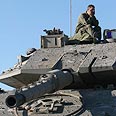
To the Litani River – from the north
Only by capturing all the territory north of the border can Israel protect settlements in the north
There are three rivers in south Lebanon – the Litani, about 20 kilometers (12 miles) from the Israeli border (it turns north near Metulla); the Awali, about 50 kilometers (30 miles) from the border, and the Zahrani in between.
Israel's ground campaign must reach, and de facto must start, from the Awali.
Why? Several reasons.
The home front
The most important goal of this war should be to defend Israeli civilians. This is the whole reason for having a country- to ensure, first and foremost, the rights of citizens. Especially their right to life.
In the first days of the war it became clear that aerial assaults alone would not reduce the number of katyushas fired at Israel. Because of this, it was clear even then that the government needed to instruct the IDF to capture all the territory that could serve as a main launching ground for short-range missiles.
Similarly, when the Germans began to bomb London in 1944, the army of Montgomery was diverted from its main strategic drive east in the direction of Berlin, and was instead diverted northward to capture the "firing region" in Holland. Defending the lives of civilians took precedence over basic strategic goals.
To put it bluntly: Soldiers are expected to die so civilians can live, not the other way around.
For our conscious
This war will not end with a crushing victory with an unconditional surrender (such as World War II), or with a total humiliation of one side (such as the Six Day War). Because of this, Israel should have conducted the war in such a way that it would be clear that Hizbullah lost.
It doesn't matter how much you hit the enemy, the fact that he still manages to survive, and even manages to carry on his daily affairs of firing 100 or more rockets at Israel daily – means they have won.
We should have worked quickly and determinedly to stop the katyushas, if not for the sake of our "terrific home front," then at least in order to strike a blow to Nasrallah's political-image standing.
Political settlement
Military actions in wartime should support political goals. Occupied territory is a political card.
Israel's standing, in the framework of negotiations about cease fire conditions and /or about the components for a new political arrangement, would have been much stronger had we controlled all of south Lebanon.
In this context, we cannot be optimistic that the Lebanese army or an international force will manage to seek out and destroy rockets from areas controlled by Hizbullah. In order to certify that this goal be included in the international forces' mandate, and that the force will operate in as broad a territory as possible, the IDF must get there first.
The military aspect
There are several principles for waging war. These include continuous attacks and concentration of power. To this point, the ground campaign, media reports suggest, has been conducted with startling ignorance for these rules.
Instead of being aggressive we are hesitant; instead of continuous, we hold our fire for extended periods; instead of concentrating our forces, we provide a slow trickle.
The media quotes army officers who rightly complain about this "half-pregnant" philosophy. Even in this war there should be a minimal critical mass.
In consideration of the first three points, this minimum must be the Awali River, but there are also strategic-operational reasons for this.
Except for the (slightly amazing) incursions to Baalbek and Tyre, we have yet to hear about broad processes based on the principle of guile or "alternative approaches."
Even though Hizbullah has got a strong, well-trained guerilla army waiting for our forces north of the border, the IDF attacks head on, rather than outflanking them.
In light of this path, the ground war should not only have reached the Awali River, it should have started from there. We should have used the air force and navy to place the thrust of our forces in the area (and perhaps even infiltrated from the east), and we should have attacked north-to-south, cutting off Hizbullah from its home front. The Awali is a most appropriate line to accomplish this.
For humanitarian and diplomatic considerations, Israel must capture as much territory as it can up to the Awali River. This is the only way we will be able to bring about a significant reduction in Qassam fire, defend civilian life and undermine Hizbullah's image and standing.
This broad territory would also serve as a diplomatic "trump card." The military considerations point to the fact that the Awali - the name means 'first' – must not only be the finish line. It must also be the starting line.
Brig. Gen. (res.) Dr. Roni Barrett is a researcher at the Jaffe Institute for Strategic Studies and a former officer in the IDF tank corps










